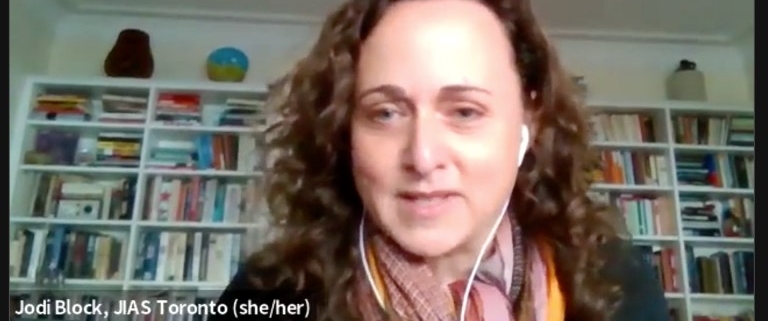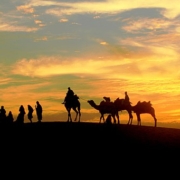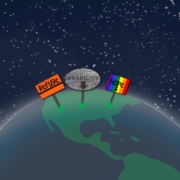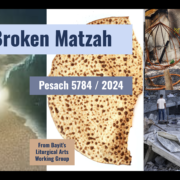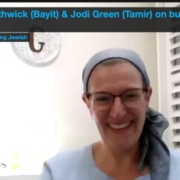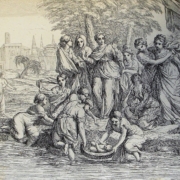Welcoming the Stranger and Protecting the Refugee: A Conversation With Jodi Block of JIAS
It has been a month since Russia invaded Ukraine. Since then over 3.6 million Ukrainians have fled their country, and another 6.5 million residents have been displaced within Ukraine, having fled their homes but still inside the country. The growing humanitarian crisis has captured the world’s attention, raising awareness as well about the plight of refugees worldwide (estimated to be about 26 million refugees and 84 million displaced persons).
In the Torah cycle we are now deep into Vayikra, Leviticus, and its teachings about sacrifices and holiness. In this week’s parsha, Shemini (“Eighth”), Aaron and his sons, the priests, are told to offer a number of sacrifices on behalf of the people of Israel on the eighth day after their ordination. Eight days does not sound long, but may have felt like an eternity as for seven days they had to remain at the entrance of the Ohel Moed (Tent of Meeting), day and night, keeping יהוה’s charge so as not to die.
We too may feel as though we are in such a liminal space, wanting to do more right now to support refugees from Ukraine and elsewhere, not sure yet what will happen and what will be.
Organizations such as JIAS (Jewish Immigrant Aid Services) in Canada and HIAS (Hebrew Immigrant Aid Society) in the United States are helping to support refugees from Ukraine, as well as from Afghanistan, Syria and elsewhere, find new homes and safe havens in North America and Europe. Jewish communities around the world are pitching in to raise funds to support refugee and internally displaced communities through JIAS and HIAS as well as through various Federations and more.
I had the honour to speak with Jodi Block, Manager of Community Engagement at JIAS, about the Jewish imperative to welcome the stranger, the refugee crisis and the war in Ukraine, and how supporting refugees and immigrants is such a hands-on way to build community and society. It is such a way to Jewishly build, and to build Jewishly. And while we ourselves may not be able to end the refugee crisis, there is so much that we can and must do.
And now is always a great time to start.
Rabbi Dara Lithwick
#bealight #welcomethestranger #protecttherefugee #olamchesedyibaneh
And here’s a transcript of the video:
Rabbi Dara: So shalom and welcome to the Bayit blog I'm rabbi Dara Lithwick 00:00:11.000 --> 00:00:21.000 I use she/her pronouns and I am joined today by the amazing Jodi block of JIAS Toronto, JAIS for Jewish immigrant aid society [sic]. 00:00:21.000 --> 00:00:30.000 But again it's much broader than that. Jodi is the manager of community engagement at JIAS and has been at JIAS 00:00:30.000 --> 00:00:40.000 for "chai" now years, 18 years, and cannot think of a more apt time to talk about building Jewish together. 00:00:40.000 --> 00:00:45.000 I mean how we want to build for the future, not just for ourselves, but for the whole world together. 00:00:45.000 --> 00:00:57.000 In this moment, right now, as war ranges in Ukraine, and the plight, especially of the refugee, is so top of mind, and this is so fundamental to the work that JIAS does so 00:00:57.000 --> 00:01:02.000 it is wonderful to have you here with us today for the Bayit 00:01:02.000 --> 00:01:06.000 blog, Jodi. Jodi: and so thank you for having me. 00:01:06.000 --> 00:01:14.000 Rabbi Dara: Thank you for being here. And so, Jodi, as we get started, tell us a little bit about what JIAS is, and what you do at JIAS. 00:01:14.000 --> 00:01:20.000 Jodi: Sure. So JIAS is Jewish immigrant aid 00:01:20.000 --> 00:01:26.000 Services, and JIAS was actually founded this year a 100 years ago. 00:01:26.000 --> 00:01:38.000 You know, which is really something, we're celebrating our centenary and JIAS was founded by the Jewish community for the Jewish community, because you know, at that time in the 1920s there were lots 00:01:38.000 --> 00:01:42.000 of Jews arriving in Canada, fleeing 00:01:42.000 --> 00:01:50.000 porgroms and persecutions in eastern Europe primarily at that time, and you know the the Canadian community wasn't so big. 00:01:50.000 --> 00:02:02.000 And this was a really significant movement of Jews to Canada and and the community prioritized the need to welcome refugees, welcome immigrants and refugees and to to make that a central part of the 00:02:02.000 --> 00:02:13.000 community's work at that time. You know I think it was mostly volunteer-driven in the beginning. And you know there's lots of us who have heard of the landsmanshaft societies of, you know, people welcoming 00:02:13.000 --> 00:02:16.000 people who were arriving from the communities they had originated 00:02:16.000 --> 00:02:25.000 from and and over the over the years JIAS became a really widespread operation across Canada. 00:02:25.000 --> 00:02:29.000 There were offices all over, you know. You hear people landing and all, you know, 00:02:29.000 --> 00:02:34.000 lots of people come through Pier 21 in Halifax, way back in the days when people were coming by boat. 00:02:34.000 --> 00:02:47.000 But there were offices all across Canada, and today today a lot of those offices have been subsumed by Jewish family services, or, you know, different agencies with that kind of name. 00:02:47.000 --> 00:02:55.000 And in Montreal they're called Ometz which is also like an umbrella of social services, and the only standalone JIAS is in Toronto. 00:02:55.000 --> 00:03:03.000 So we're the only jewish organization in all of Canada that has the sole mandate of welcoming and supporting immigrants and refugees. 00:03:03.000 --> 00:03:07.000 And and we're also aside from being a settlement agency. 00:03:07.000 --> 00:03:17.000 So that means that we, you know, provide all kinds of services from like pre-arrival through the settlement journey of people settling later up to like 3 to 5 years in Canada. 00:03:17.000 --> 00:03:30.000 We're also a sponsorship agreement holder, which means that JIAS is pre-approved by the Canadian Government, by IRCC [Immigration, Refugees, and Citizenship Canada] as a partner to sponsor refugees in partnership with Canadian citizens 00:03:30.000 --> 00:03:39.000 and the the private sponsorship model which we don't need to get into, because it's a whole other conversation, is a really, it's like a world renowned model for bringing refugees to Canada and 00:03:39.000 --> 00:03:45.000 it's it's now being replicated a little bit in the States. 00:03:45.000 --> 00:03:48.000 Rabbi Dara: Yeah, i've heard that, i've seen that in terms of welcome circles. Yeah, Yeah. 00:03:48.000 --> 00:04:02.000 Jodi: JIAS is now really involved in these welcome circles which sort of built on, is a little bit based on the model of private sponsorship of refugees, and and JIAS today i'll just end by saying is continues to 00:04:02.000 --> 00:04:09.000 be a Jewish community agency, continues to receive some funding from UJA Federation to support specifically Jewish newcomers. 00:04:09.000 --> 00:04:19.000 But we're an, we are an IRCC supported agency. So we're government funded- over 60% of our funding comes from the Federal Government, and we we welcome diverse newcomers. 00:04:19.000 --> 00:04:24.000 Rabbi Dara: So amazing. Okay, I mean that's that's amazing and So I mean it's amazing. 00:04:24.000 --> 00:04:36.000 Yeah, but sort of more broadly, how JIAS helps newcomers all over, how there are so many points of contact, too, coming in, I think, about Pier 21, and I've been to Pier 21 in Halifax, which I guess for 00:04:36.000 --> 00:04:40.000 our American friends is sort of like the Ellis island of Canada (Jodi: that's right). 00:04:40.000 --> 00:04:46.000 And and you also mentioned HIAS, which is and I would say you know, I said, I mistakenly earlier, said society. 00:04:46.000 --> 00:05:00.000 It's JIAS, Jewish Immigrant Aid Services, HIAS is the American counterpart, which is the I believe it's the Hebrew Immigrant Aid Society. You know or that sort of thing, and so you work together in in different ways or or things 00:05:00.000 --> 00:05:16.000 like that Jodi: so HIAS, I think, when HIAS and JIAS were each founded and HIAS as a little older, we did really similar work, and today, as as you probably know, HIAS has sort of shifted its mandate and 00:05:16.000 --> 00:05:22.000 really works primarily with refugees, and they have an amazing tagline, which is, you know, "We used to help refugees because they were Jewish. 00:05:22.000 --> 00:05:24.000 And now we help refugees because we are Jewish." 00:05:24.000 --> 00:05:36.000 So I think HIAS has offices in like 12 or more different countries around the world, and they do a lot of work with refugees where they are currently like, where they in their sort of third countries and they do a lot of 00:05:36.000 --> 00:05:47.000 advocacy work in getting refugees to the States and like JIAS, they no longer actually use their full name of Hebrew immigrant aid society because of the shift in their work. 00:05:47.000 --> 00:05:51.000 They remain like very much a Jewish organization for sure. 00:05:51.000 --> 00:06:01.000 So JIAS sort of remains more kind of true to our original mandate, which is that we still primarily work with immigrants once they are in Canada. 00:06:01.000 --> 00:06:07.000 And we as a, as a sponsorship agreement holder, we do have this ability to sponsor and bring refugees to Canada. 00:06:07.000 --> 00:06:14.000 So we are involved in in that piece. but We're primarily like our services are offered in Canada. 00:06:14.000 --> 00:06:17.000 Yeah, getting people here and then working with them once they arrive here so a little bit different. 00:06:17.000 --> 00:06:24.000 But we do work with HIAS for sure. We just had refugee Shabbat, which is a HIAS initiative. 00:06:24.000 --> 00:06:33.000 That JIAS shared in canada and and we're in touch with HIAS on a whole bunch of different issues, and and you know but but we do a little bit. 00:06:33.000 --> 00:06:40.000 We we work a little bit differently. our focus is different for sure sure. and I think it's become so much more top of mind. 00:06:40.000 --> 00:06:57.000 Rabbi Dara: Of course, you know, thinking about the current situation, and I think refugee Shabbat, which is just one or 2 weekends ago, and it was HIAS was running in the States and JIAS, as you say, here in Canada But also using I love that tagline you know we 00:06:57.000 --> 00:07:00.000 came to that, You know we we escaped, you know, as refugees. 00:07:00.000 --> 00:07:10.000 Now we we sponsor because we are we're Jewish because we understand that, and that that piece you know that I see in one of the highest tag lines, of the motto of you know welcome the stranger which we find all 00:07:10.000 --> 00:07:23.000 over Torah and protect the refugee. Also, you know value that we find all over Torah when we look right now with war raging in in Ukraine. 00:07:23.000 --> 00:07:34.000 This has become so top of mind but there's already I was looking at at your your website, and looking at also HIAS statistics. 00:07:34.000 --> 00:07:46.000 There's already a massive world refugee crisis underway, and you know what you do as an organization in terms of you know, helping with services. 00:07:46.000 --> 00:07:53.000 Once they arrive at once they arrive helping with sponsorship and more being tacked into that right now. 00:07:53.000 --> 00:07:59.000 How do you think we could take advantage or balance sort of the energy that we have right now in the awareness 00:07:59.000 --> 00:08:15.000 it seems that we see across the world to help refugees freely in Ukraine to recognize that there are, you know, 26,000,000 other refugees right now around the world, and need help, I mean and that that's almost 00:08:15.000 --> 00:08:25.000 the whole population of Canada, you know, who are displaced, and who are, I guess, refugees. Jodi: Not all the numbers, but but even more people [...]. 00:08:25.000 --> 00:08:30.000 If you actually went to the displaced person's definition which means that they could still be in their country of origin, 00:08:30.000 --> 00:08:41.000 I think there were 84,000,000 people. I read this, which is like mind-boggling right, like I think the whole population of Canada is about 38,000,000. 00:08:41.000 --> 00:08:46.000 So you know it's over double it's just totally mind-boggling. 00:08:46.000 --> 00:08:50.000 Yeah, I mean it's an interesting it's an interesting issue like right now. 00:08:50.000 --> 00:08:57.000 We're all watching we're worrying we're everybody's hearts are with ukraine because we're seeing it up close and personal. 00:08:57.000 --> 00:09:07.000 And it's. it's it's it's a you know It's brutal and you know we're seeing people doing It's it's actually really incredible to see how they're being embraced 00:09:07.000 --> 00:09:13.000 by the surrounding communities and surrounding countries, you know, in Romania, Poland and Hungary and wherever else, 00:09:13.000 --> 00:09:23.000 Moldova, it's it's actually somewhat unusual for refugees to be sort of welcomed and cared for in the ways that they are. 00:09:23.000 --> 00:09:35.000 The situation is nevertheless I mean totally heart wrenching but you know there's there's so much interest in assisting. 00:09:35.000 --> 00:09:40.000 It's. Sometimes it's hard to sustain that interest, right, people. 00:09:40.000 --> 00:09:50.000 People. We, of course, had this huge rush of support during the Syrian refugee crisis for Syrian refugees, and that propelled an incredible piece of work. 00:09:50.000 --> 00:09:55.000 I mean, and in Canada I Don't know if the audience for this is primarily in Canada or not. 00:09:55.000 --> 00:10:06.000 But in Canada you know, we had almost 20 synagogues and over 30 different groups of private sponsors, bringing 150 Syrian refugees in the period of a year through giants. 00:10:06.000 --> 00:10:16.000 Rabbi Dara: So in Ottawa we sponsored a family and we sponsored the family and we sponsored another family since, and actually our teens are still working to sponsor a third refugee 00:10:16.000 --> 00:10:18.000 this is through. This is actually an interfaith group. 00:10:18.000 --> 00:10:24.000 I mean this is a lovely thing. we have our teen group that's working with 00:10:24.000 --> 00:10:27.000 the sponsorship, what is the sponsorship group? 00:10:27.000 --> 00:10:48.000 Is, is a united church, actually, And we're working with a mosque youth group, and you know, to sort of to sort of work to raise funds to bring in this this third family, and still I mean I remember hearing about JIAS actually back it was in 2015 where that sort of came out to my radar when we were working to bring in 00:10:48.000 --> 00:10:53.000 Syrian refugees. I mean from this summer there's still thousands, I believe, of afghan refugees that are still. 00:10:53.000 --> 00:11:02.000 Jodi: Yeah, I was gonna I was gonna say like you know there's there's unfortunately there's no shortage of people who desperately need help. 00:11:02.000 --> 00:11:12.000 Right. So August September we got tons and tons of offers from people who wanted to assist Afghan refugees, and we are in the process of working with a bunch of different groups to bring you know hundreds 00:11:12.000 --> 00:11:20.000 of Afghan refugees to Canada. But in the meantime, you know, when, when, when individuals were saying, we want to help, we want to help now. 00:11:20.000 --> 00:11:27.000 And we were saying, well, that they're probably only going to be here in like 6 months or a year, You know you. 00:11:27.000 --> 00:11:31.000 It's hard to like harness that energy people move on to something else. 00:11:31.000 --> 00:11:39.000 So. unfortunately. now, people you know, are captivated, by what's happening in Ukraine, and and and we all are focusing so much energy on it. 00:11:39.000 --> 00:11:48.000 I say, unfortunately, because it's an unfortunate situation and you know, I believe that the community has the capacity to do incredible stuff. 00:11:48.000 --> 00:11:52.000 Incredible fundraising, both for humanitarian aid overseas and to help welcome newcomers. 00:11:52.000 --> 00:12:02.000 If that's what we're gonna see so we're bracing to to welcome you know lots of refugees, they might not technically come as refugees because the Canadian government's sort of opening all 00:12:02.000 --> 00:12:09.000 these different pathways. but you know I think we are going to need incredible community support for them, Jewish and non-jewish. 00:12:09.000 --> 00:12:18.000 But there's, still like there's still I was noticing this meet this weekend on on social media like Citizenship and Immigration 00:12:18.000 --> 00:12:28.000 Canada or IRCC is what they're officially called but we're like posting about Afghan's arriving, and and it was almost like, Wow! 00:12:28.000 --> 00:12:35.000 That's already like people aren't focused on that now, but that's still very current that's still, you know very much a need. 00:12:35.000 --> 00:12:47.000 So we're always balancing that need of like there there were already a world refugee crisis, and it's only no being compounded by this tragedy that's happening in Ukraine. Rabbi Dara: It's so interesting, as 00:12:47.000 --> 00:12:59.000 we're talking, i'm thinking about the 18 being here, 18 years at JIAS, "Chai" years, chai means life, and you know really what drives JIAS is helping giving a new life to so many people you know who come to, come to 00:12:59.000 --> 00:13:11.000 Canada, and the HIAS is the same you know in the in the States, and more, I mean, i'm thinking, too, I keep kind of as you were saying about this, you know, just sort of the the 26,000,000 refugees and 84 00:13:11.000 --> 00:13:19.000 million displaced persons around the world and I'm thinking about, you know, we keep coming back to this line of Talmud, you know, 00:13:19.000 --> 00:13:26.000 and it is "lo alecha ha melacha ligmor", You know "it's not upon you to finish the work, but nor are we free to desist from it." 00:13:26.000 --> 00:13:32.000 So you know, How do we? How do we keep engaged and keep connected? 00:13:32.000 --> 00:13:40.000 Let us take that you know for again, this is for both Jewish and non-jewish, and and not just those in a refugee situation, and a refugee is a refugee and I think that's 00:13:40.000 --> 00:13:51.000 important, too, in terms of, you know, how we might be seeing some systemic racism playing out in in some of the discourse around what's going on right now in Ukraine. 00:13:51.000 --> 00:14:00.000 But if we, if we take that step back and we go to the what motivates, what should keep motivating us? 00:14:00.000 --> 00:14:08.000 And how do we keep our our communities, and i'm speaking from a Jewish perspective, engaged in in refugee support, and settlement, and and you as a person? 00:14:08.000 --> 00:14:15.000 What has kept you at JIAS for for 18 years, and sort of if you how would you see us 00:14:15.000 --> 00:14:22.000 supporting the vision that you would want for the future? Jodi: wow that's a big one. 00:14:22.000 --> 00:14:28.000 Well, first of all, you know that line of Talmud of that you brought forth. 00:14:28.000 --> 00:14:41.000 We recently, I think you you may have seen it. We put together a little video of different people, different refugee advocates and supporters from across the country and around the world of what motivates to them and that was one 00:14:41.000 --> 00:14:46.000 of the things that came up, and you know a number of people said to save, To save a life is to save the world. 00:14:46.000 --> 00:14:54.000 People talked about. You know, tikun olam and the importance of trying to trying to repair this very broken world. 00:14:54.000 --> 00:15:04.000 You know, i've do really love working at JIAS, I mean obviously 18 years, a long time, you know. 00:15:04.000 --> 00:15:13.000 I think, recently also interviewed someone who's very active in refugee sponsorship, and she said she said something that really resounded to me. 00:15:13.000 --> 00:15:19.000 She said. You know she had moved here from another country in a good situation, you know, as an economic immigrant, just looking for opportunity. 00:15:19.000 --> 00:15:26.000 It was kind of an adventure. it was like a very different kind of immigration, and still, you know, lost in so many ways. 00:15:26.000 --> 00:15:33.000 Not, you know there's, there are so many challenges that come with immigrating, no matter how you immigrate to Canada or to another country. 00:15:33.000 --> 00:15:46.000 And and so she said, you know and she remembered that her Her employer at one point said to her right after you know, a few months after she'd arrived in the country like take a couple of days. i'm going to Hook, you up like i'm going to help 00:15:46.000 --> 00:15:57.000 you find a doctor and a dentist and a you know, and like all these things that she hadn't been able to do on her own, and she says she still remembers how helpful it was, and how powerful it was that they recognized 00:15:57.000 --> 00:16:08.000 that, like she had. all these, you know, challenges as a newcomer, even in her sort of privileged newcomer situation, and and that resounded with me in the sense that like you can make you can really make a 00:16:08.000 --> 00:16:23.000 profound difference for people by helping in small ways. And obviously when you talk about the refugee crisis, the issue is so big and that the number is so big, and there are so many people in need of help. 00:16:23.000 --> 00:16:29.000 And and you know it is about saving lives but it's also about changing lives. 00:16:29.000 --> 00:16:33.000 So people come here and and getting them here is saving their life. 00:16:33.000 --> 00:16:49.000 But then the impact that people can have by participating in the settlement process is just by just by helping, by being a friendly face, by being a resource, you know, being there to answer questions by taking them around to figure out how 00:16:49.000 --> 00:16:53.000 to get around the city and taking them to the bank and helping them, 00:16:53.000 --> 00:17:04.000 you know, understand when that when a health issue comes up how to navigate the health care system, and how to advocate for themselves and like, there's so many different things that volunteers get involved with when when we do private 00:17:04.000 --> 00:17:10.000 sponsorship of refugees, and we really want to replicate that for all newcomers. 00:17:10.000 --> 00:17:24.000 You know. Obviously, people have varying degree of need but, you know, if people are looking for ways to do hands-on work like, there is a lot of rules, so there's a lot of opportunity for for volunteers to have a really 00:17:24.000 --> 00:17:33.000 great impact on someone, even if the sort of task at hand doesn't sound life saving, you know, it is life changing. 00:17:33.000 --> 00:17:38.000 So, so you know in the situation where we're in right now we don't know how people are going to be coming to Canada. 00:17:38.000 --> 00:17:43.000 I don't think they're going to be coming as you know privately sponsored refugees, or even government assisted refugees. 00:17:43.000 --> 00:17:49.000 I think they're going to be able to come through a number of different pathways, so they may not have the official designation of refugee. 00:17:49.000 --> 00:17:55.000 But they're leaving behind everything, right? and be arriving with essentially nothing. So in this particular situation, I think we're gonna need to do. , 00:17:55.000 --> 00:18:10.000 You know certainly fundraising that we maybe haven't looked at doing for for in other situations. But in terms of the volunteerism, you know, the beautiful thing about private sponsorship of refugees and again. 00:18:10.000 --> 00:18:11.000 Maybe i'm referring to something that people don't know a lot about. 00:18:11.000 --> 00:18:18.000 But it involves like providing funding for refugees, but also a circle of volunteers like a network of volunteers. 00:18:18.000 --> 00:18:21.000 Yes, to be there for them, and it has to be at least 5 people. 00:18:21.000 --> 00:18:27.000 So it's like a group of people that sort of like embrace the newcomer with like can help you 00:18:27.000 --> 00:18:30.000 with this, we can practice English, I can take you to register 00:18:30.000 --> 00:18:33.000 your kids at school - like all these different things, we really want to try and replicate that. 00:18:33.000 --> 00:18:47.000 And we're looking at sort of building. a model. and you know as the Ukrainian newcomers arrived that we can match them with groups of volunteers who can Who can provide that for them you know what and that piece? 00:18:47.000 --> 00:18:50.000 You know I referred to this interview. I had like it. 00:18:50.000 --> 00:18:55.000 What motivates me. It really is that, like you, make a huge difference for people through this, through this work. 00:18:55.000 --> 00:19:03.000 I mean people come to a new country to for better opportunity to rebuild their lives because they have nowhere else to go. 00:19:03.000 --> 00:19:06.000 Like, for lots of different reasons, there's the push factors as the pull factors. 00:19:06.000 --> 00:19:20.000 But whatever the factors are, it's always challenging and certainly in the case where you're talking about refugees, the challenges are, you know, enormous in many ways and I feel like a place like JIAS and and people who engage as 00:19:20.000 --> 00:19:29.000 volunteers. Also, you know, you can really make significant difference for people in in small ways and in big ways. 00:19:29.000 --> 00:19:42.000 Rabbi Dara: Thank you so much and and as we sort of wrap up I think about how, you know, i'm interviewing this for the Bayit builder's blog and Bayit's meaning,it means home, and it was, you know, it's 00:19:42.000 --> 00:19:47.000 all and sort of the motto around Bayit is building, building Jewish. 00:19:47.000 --> 00:20:00.000 I say, and particularly as you talk about private sponsorship, and as you talk about the work that you do in terms of helping those who come here to Canada and again, the supplies of different ways. 00:20:00.000 --> 00:20:18.000 Of course, in the States is about building a better home together, and and a safe place, a safe haven, and a place to build new memories, and in a way it's such a beautiful way to build jewish and it's also such a fundamental 00:20:18.000 --> 00:20:25.000 way it's not a nice thing to do it's imperative, we are, we know the heart of the stranger also as you talk about it. 00:20:25.000 --> 00:20:38.000 Jodi: So that's right we've we've been there we've experienced what it is to be homeless and stateless, and and I think you know that I think motivates a lot of the people who are really active in the 00:20:38.000 --> 00:20:48.000 refugee space of we should, you know, no one should experience that and and you know, welcoming newcomers, you know. 00:20:48.000 --> 00:20:58.000 And again we welcome lots of jewish newcomers and that's sort of a bit of a different piece of building our own community, and we welcome diverse newcomers, which is sort of reflecting what you know canada takes 00:20:58.000 --> 00:21:07.000 pride in its diversity. and and it, you know, Canada has a really strong record, and particularly in recent years of humanitarian resettlement. 00:21:07.000 --> 00:21:11.000 So. Yes, Canada welcomes newcomers because we need them because we need our economy to grow, 00:21:11.000 --> 00:21:21.000 We need our population to grow but Canada also recognizes as a responsibility to help others, and certainly within the Jewish tradition. I mean, I think we're told to welcome the stranger what 36 times in the torah 00:21:21.000 --> 00:21:26.000 like that's a lot of times you know it's really central to our values. 00:21:26.000 --> 00:21:31.000 And so you know it's a privilege I think to be part of that in you know, 00:21:31.000 --> 00:21:40.000 in a professional capacity. Rabbi Dara: Yeah, right thank you so much jodie and it's such an honor, and a pleasure to have had this chance to speak with you. 00:21:40.000 --> 00:21:51.000 And again, i'm gonna post when we post this book i'm gonna put different resources for folks in Canada and in the States to be able to help with the work that is going on. 00:21:51.000 --> 00:22:05.000 Right now, and and I think we're all encouraging each other, that as part of building, as part of building, to have that element of supporting, of welcoming refugees and protecting strangers as part of our our fundamental 00:22:05.000 --> 00:22:09.000 ethos, and what we do, and how we do Jewish. 00:22:09.000 --> 00:22:23.000 Jodi: So the thanks you so much for inviting me for this conversation, and thank you for your support.

Rabbi Dara Lithwick, the lead builder at Builders Blog, is an advocate for LGBTQ2+ inclusion within diverse Jewish spaces and for Jewish inclusion in LGBTQ2+ spaces. When not at work as a constitutional and parliamentary affairs lawyer, Rabbi Dara is active as an outreach rabbi at Temple Israel Ottawa. She is a member of Bayit’s Board of Directors.

